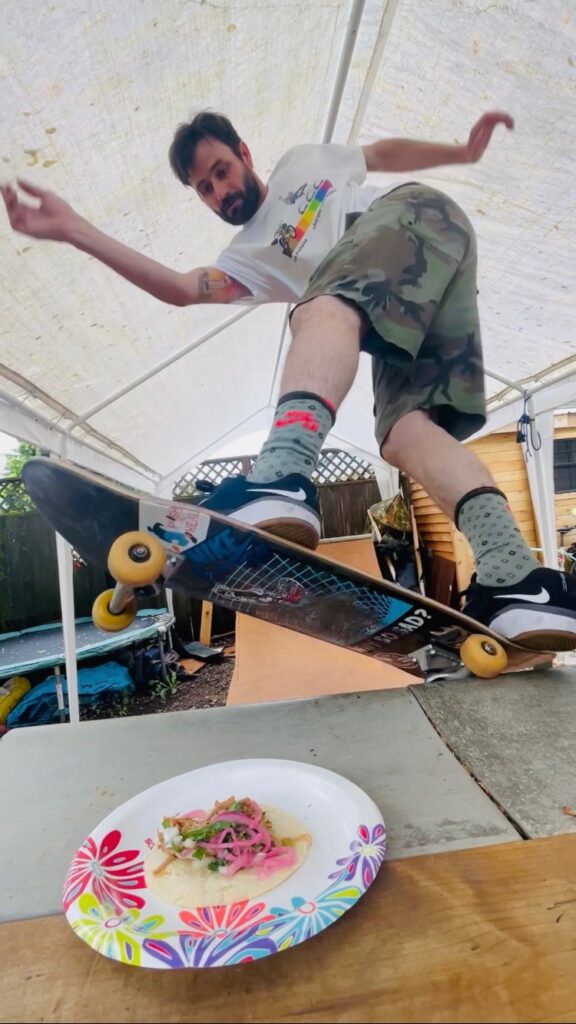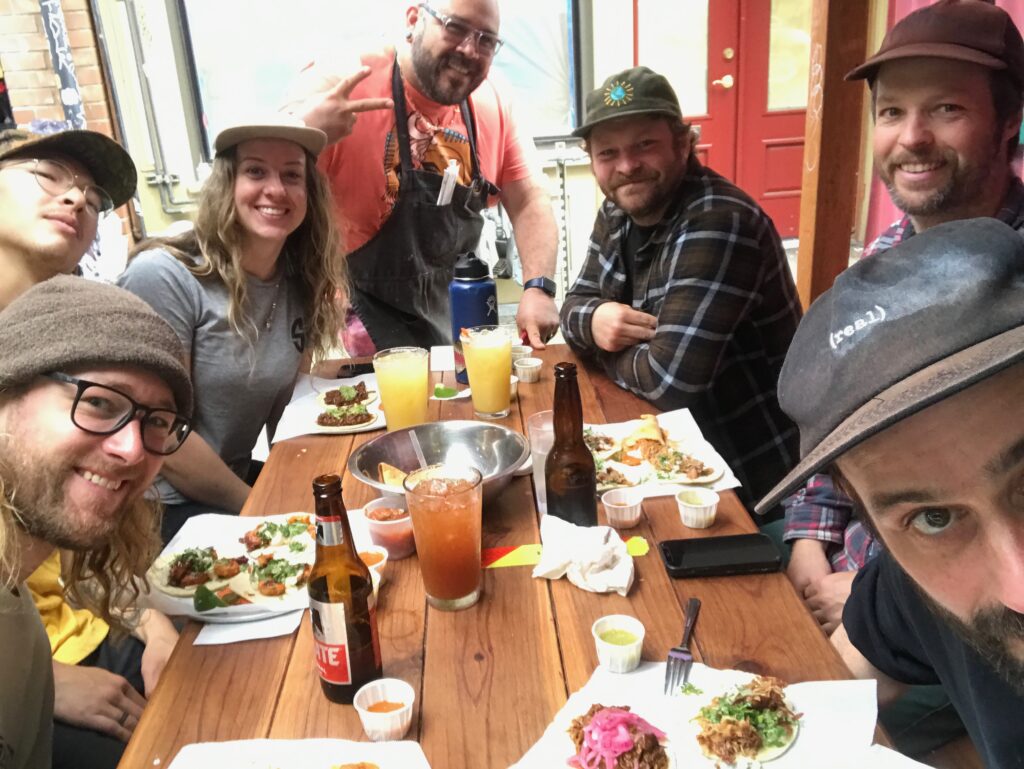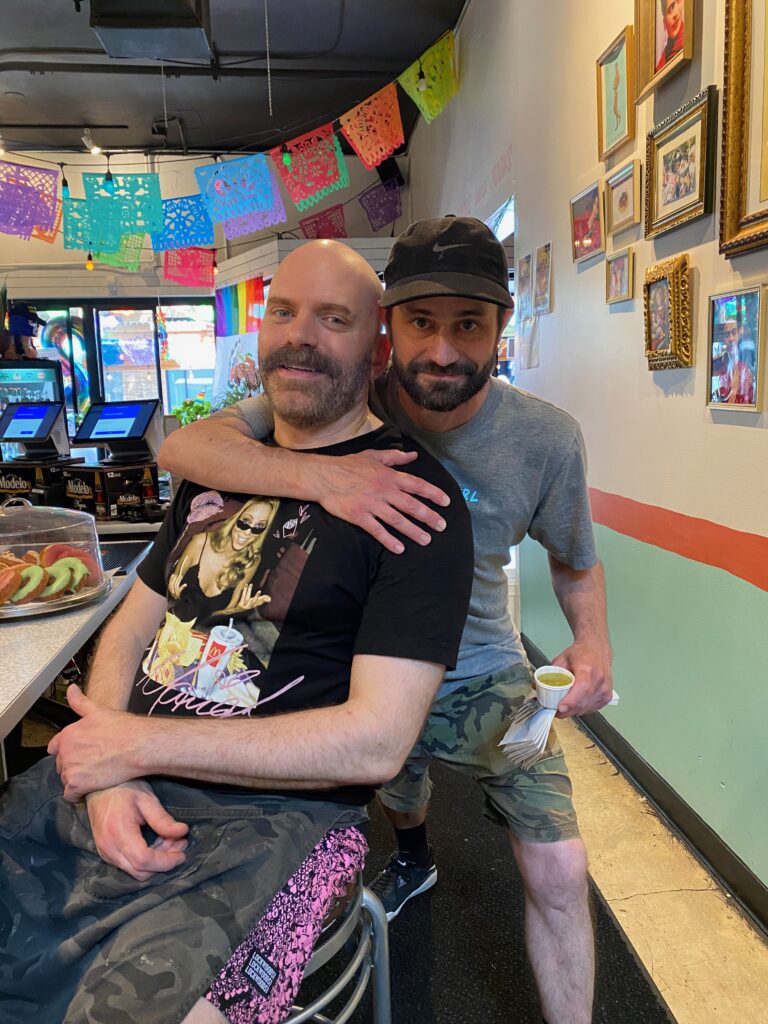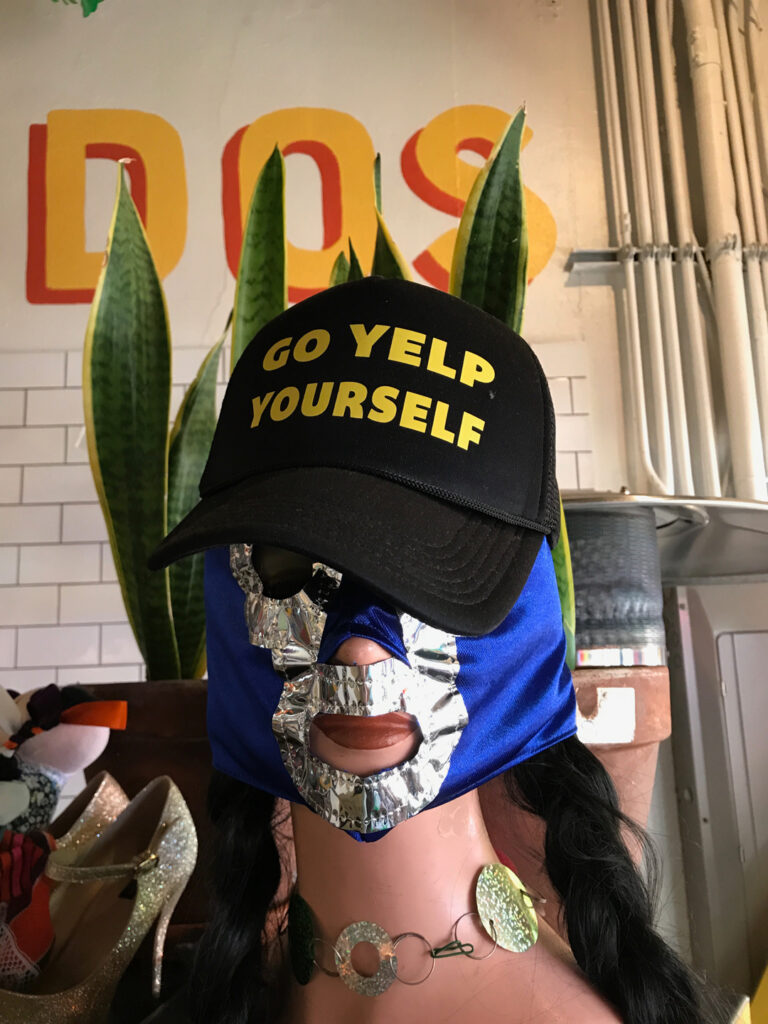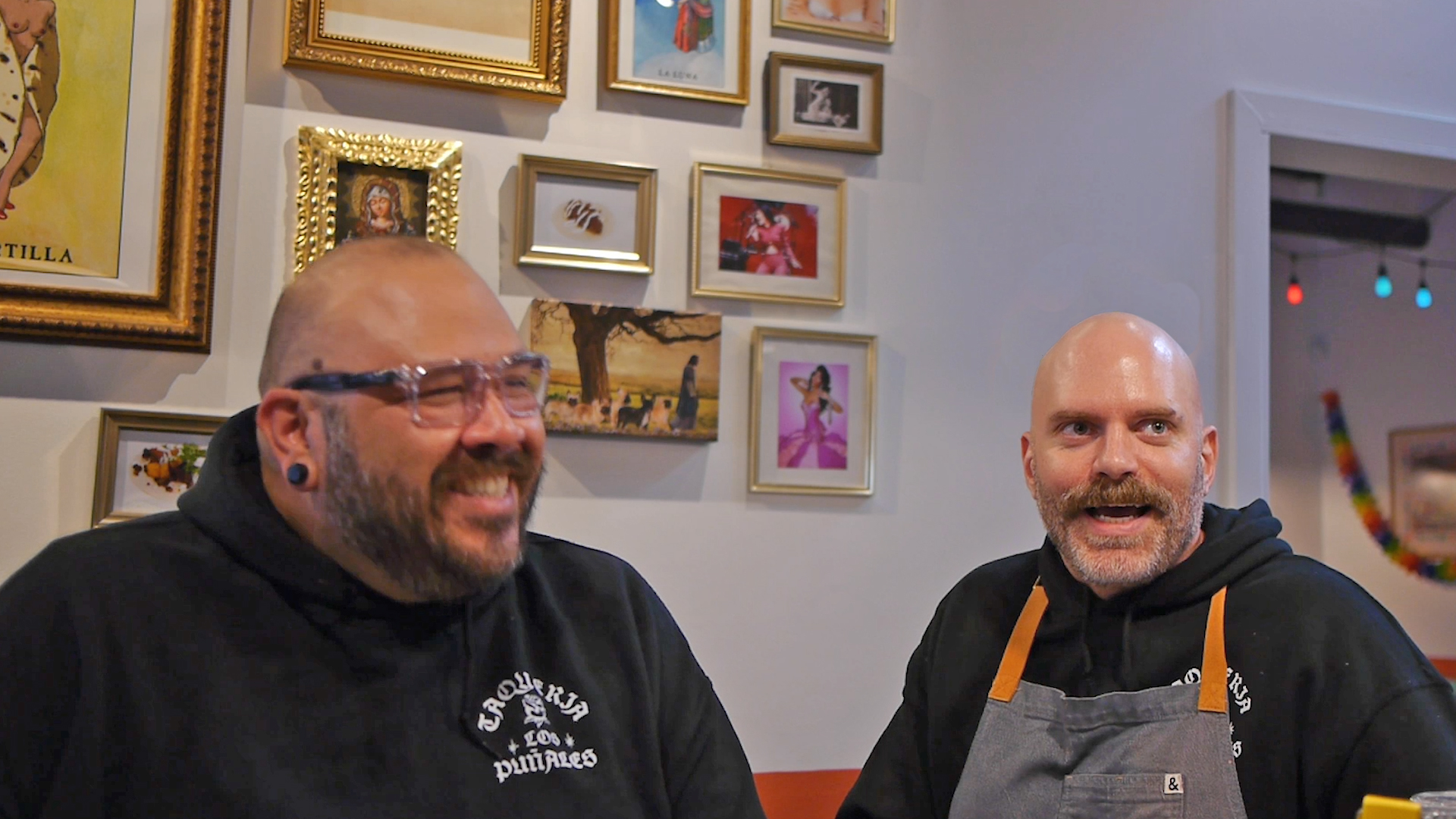
I sat down with my friends David and Brian, the owners, and operators of my favorite Taquería. We talked about opening a restaurant at the onset of a global pandemic, what it means to run a business serving a community, how our childhood traumas affect our adult brains and how we find a path to healing from the pain those rough experiences imbued on us.
This interview took place in June 2022 right around the same time we worked together with Brian, David & the Los Puñales Taquería crew, as well as Portland recycled skateboard experts, MapleXO, to raise some $s for Quest Integrative Health as part of the “Why So Sad?” mission and the Taquería’s 2nd anniversary.
John:
Los Puñales is two! How does it feel so far and what would you say are the biggest lessons you’ve learned while you’ve been building the brand and business within the Portland community?
Brian:
I can’t believe we’ve made it two years. We opened in June 2020, three or four months into the Pandemic. It was a really tough time and we just said, “Let’s do this. Let’s see how this goes.” Somehow it worked out.
We went into it thinking something like, well, we’re the only new restaurant in a market where everything is closing. So, that seemed like an opportunity that the pandemic provided, and it worked out.
In the last two years, the learnings are that when you make food for yourself that you put love into because it’s food you want to eat, nothing else matters, everything will fall into place as long as you do that. And people will taste that.
David:
Those are my lines. [Laughter]
Brian:
You can say it too, better than I can.
I’d say the hardest thing about it all is managing people, so my other big learning is “invest in people” like really invest in them. Try to find great people to work with you and help you create an awesome experience. All in all, I think the community, the local Belmont community, the queer community have really contributed to our success.
David:
Yes. It’s been a good couple of years and like you say it’s hard to believe because we started working before the pandemic, and we have the whole idea and the concept, and we traveled for it [researching] and the pandemic happened and it’s like, “What we gonna do? Should we put this on hold?” So, we risked it. We risked it and it’s thanks to him [Brian] he was the push person, all, “Let’s do it, David! Let’s do it!” You know? The food is good, so that’s what we did.
Now we are part of the neighborhood, and the community has been good to us and we’re still here. Sadly a few businesses closed, but we’re still here thanks to the community and the good food that we make.
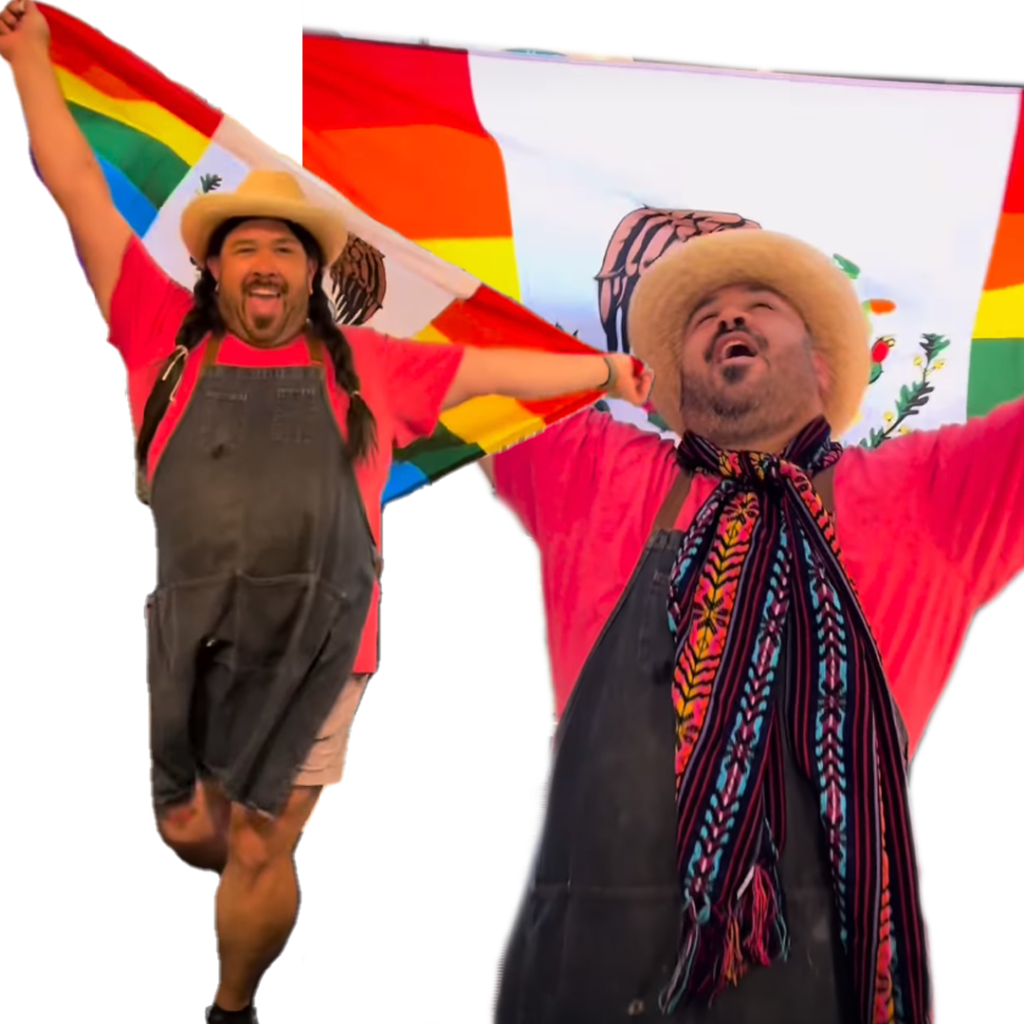
John:
So, David, what would you say is the biggest lesson you’ve learned and earlier you mentioned Lady Gaga?
David:
Haha, well, it’s a phrase that Lady Gaga used. Honestly, I was ready to go back home to Guadalajara because I’ve been here for so many years and Brian and I we know each other for most of that time and I tell him, “I wanna go home,” and he says, “We should open a Taquería!” and I say, “What? You wanna open a Taquería? Man, you don’t even know anything about Taquerías.”
Brian:
I know a lot about restaurants though. I’d worked in restaurants. I looooove food.
David:
So, when I met him, he works for The Ringside and he was 20 years old.
John:
Sommelier?
Brian:
Yeah, I was training under the Sommelier, and I was assistant to the Maître d.
David:
Yeah, so I know him, he works in the food industry so he’s like, “Let’s open a Taquería, David.” And I was like, “Brian wants to open a Taquería, and I want to go home?” And honestly when I say about the Lady Gaga quote it’s, what does she say? It’s like, you know, nobody believes in her, but one person believes in her and that’s what it takes for her to be where she is right now and this is Brian and my story. I’ve been here so long, and I come from a family of Taqueros. I grew up with my dad and my grandma making tacos de tripas and my dad still had the business in Guadalajara. I worked here in the restaurant industry, but I never had anything in my head about open a Taquería until this guy. So, he believed in me and here we are right now. So, it’s the learning, that one person believes in you and then we have this great restaurant to make the great food. Food that we love.
We don’t make food to make money, no we make food because we like the food that we make, and we like to hear the people loving the food.
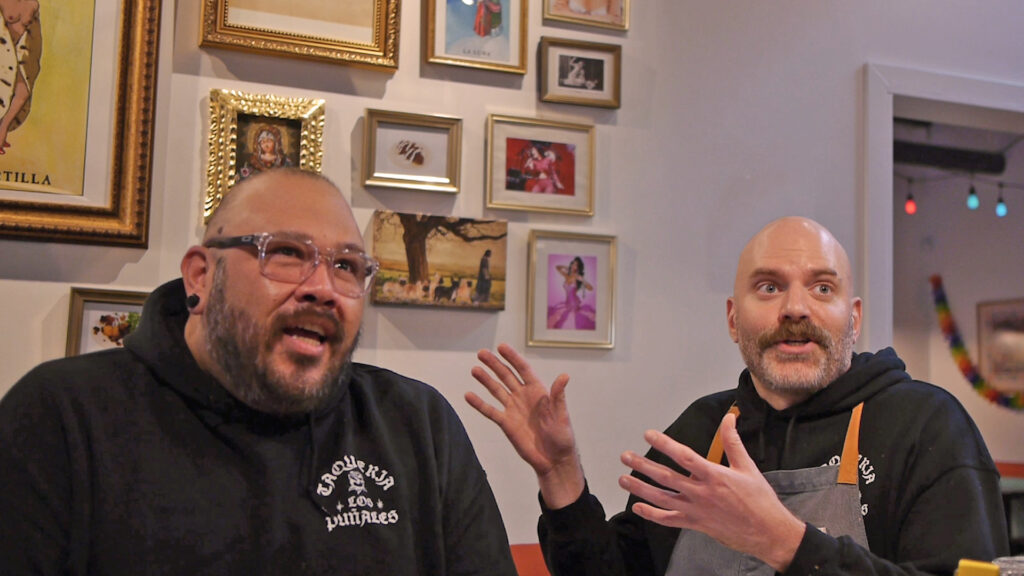
John:
What you said, David, about having that single person who believes in you and that’s what helps you move forward and do something that makes you happy and helps you in life. In the Mental Health First Aid training for youth, they lead with this idea that one of the single biggest factors that creates resilience and helps kids get through is the presence of a trusted, stable, older figure in their life. It can be one person. The majority on the call I organized—with Deluxe, Skate Like a Girl, Enjoi, Nike SB and Converse—said that the figure in their lives had been the person who worked at the local skateshop. But it can just as easily be that person who works at the Taquería. Or it can be later in life, and it can be Brian encouraging David.
So, what I’ve been reading about lately is how our brains develop when we are a kid, all the traumatic experiences that we have become embedded in our brains as automatic associations that go on to provoke us to respond rapidly, without thinking, to situations moving forward. Our brains automatically assess whether we are safe or threatened before we get a chance to think a thought. It’s how we’ve survived, but it can also cause problems. So, my question is, this idea of what happened to us as children, the traumas we experienced growing up, how has that impacted us as adults, how has it impacted our emotional or stress-response as adults. Is that something either of you’ve considered or have a point of view on?
Brian:
I definitely have felt the adult pain of those adverse childhood experiences. They definitely have carried on into my adulthood. To use an easy example, when I was 12 my sister had an aneurism while playing soccer—an arteriovenous malformation—so a super-aneurism. She was life-flighted—in a coma for three months. We were told she wasn’t going to live.
It was a really traumatic experience for my parents and me and my brother. My parents weren’t around, they were at the hospital or they had to be at work. My reaction as a child was, “everything’s going to be fine and I’m going to assure everyone in my family that everything’s going to be ok.” That became my role. I was the youngest. My sister was the middle child. And I became the middle and my sister became the youngest because she was going to have to spend the rest of her life recovering from this insane brain trauma.
So, I became that person in the family that was all, “You don’t need to worry about anything. Everything’s gonna be taken care of,” at the age of twelve. And that’s something that I carried on well into my adult life which you can imagine, can be problematic at times.
It’s something I’ve had to decouple and break down and realize, wait, maybe I’m not that person who’s here to take care of everybody and make sure everything’s perfectly ok for everyone at the compromise of my own health and wellbeing.
John:
It sounds like you’ve realized as an adult that you can give yourself a break and that’s ok. That you can forgive yourself almost, meaning that you can recognize that it’s not all on you. Or said another way, you now see that you are empowered to set your own boundaries.
Brian:
Yes. Even to this day, you know how they say, as soon as you’re with your family you go back to childhood behaviors? Literally, when I’m back with my family, I’m the one helping out my mom and trying to get everything done. The pattern falls back into place.
David:
He’s the driver.
Brian:
But I don’t want to be the driver. I want equals so someone can take the wheel and I can take a nap in the back!
John:
Ok, I would love to hear from David about this idea of what happened to you as a child impacts your development and then plays out in your adult life and then we have to learn to reconcile those things and use that knowledge to deal with our stress and challenging emotional states.
David:
Coming from Mexico, with the culture, religion, and family, being gay is the worst. You are carrying the name of your dad and your grandpa because I was the first-born male on both sides of the family. So, that’s a lot of weight on my shoulders to be accepting of myself and the family as well.
So, since I was a little kid, I was attracted to men. And I see the other kids like me being different from me, like being more feminine, but I was never feminine.
So, [I’m in this culture where being gay] is bad and wrong but also, I’m growing up with my dad who is an alcoholic and drug addict. At that time, I was living in a household where there’s a lot of violence. Violence towards me, towards my mom, towards everybody in the house because my dad. Dealing with that on top of dealing with being gay as a kid is a lot.
To try to be who you are with everyone saying, “no, that’s wrong, that’s bad,” you have to hide in this shell where you don’t want to be known as the gay kid of the family. Being a kid and not being accepted by my family, that’s what drove me to come to the states when I was 17 years old. Because I didn’t see acceptance back then from my family and because living with my dad as drug addict and alcoholic.
Nowadays he’s been 17 years sober, and things are different but living with that as a kid is very hard. Coming up here for me when I had to be working for myself to survive because I cannot rely on my parents because I’m gay. So, I couldn’t ask for any help from my parents because they don’t accept me and on top of that having my dad’s name and my grandpa’s name, they’re like, “You’re the worst.” I think it’s really hard when your parents give you their birth name when you’re gay because it’s all that weight on your shoulders.
John:
If the culture is that, “hey, that’s [being gay] is a bad thing.”
David:
Yeah. So, coming up here, I didn’t have a kid’s childhood, you know, playing with your friends, I didn’t grow up doing that. Instead, I was always trying to work and make some money and the reason was that nobody wanted to play with me because I was the puñal. I was the “jotito”, I was the “maricón,” I was the “mariposa”.
John:
Wow. That is tough. My dad was an alcoholic also, he died when I was 13. So, 13 years of chaos up to a big moment when…now he’s dead, and we’re at a funeral and… so that was my formative years that I’ve been dealing with for the last, you know, 30 years since.
And then the feelings of being separate and not accepted by the people we are supposed to love most, our family and friends, that has a major impact.
So, knowing what you know now, and thinking back to what’s happened to us, what are some tools and techniques and ways that you’ve learned as adults to deal with and manage the stress and the pain that came from all of that?
David:
So, when I said that I was living with my dad at that time, he went to the hospital three times because of alcoholism and drugs. I was younger, like 13-14 years old, and I wished he was dead. I told my mom, “Mom, let him die. I don’t want to live this life anymore with him. Drinking, hitting me, abusing me, abusing you, abusing my brothers and sisters and I want him dead.”
But I didn’t know anything about what he was going through, I didn’t know his problems. His dad was killed when he was a kid as well. He got shot in the back. Another Taquero shot him, and he died when he was a little kid. So, he has the struggle carrying with him his whole life. And eventually, you know when I say he stopped drinking, 17-years ago, because he went to look for help.
After he went through that, we started talking with each other. We are in a good space right now. I love him and I understand what he was going through—and all these things that you’re not aware of when you’re a kid but you’re living in that situation. And right now, he’s still alive, my mom’s still alive and we love each other because we understand each other now. So, now he comes to the states, he visits me, I hug him, I kiss him. Growing up as a kid, I couldn’t do that with him. Now that we are adults, we can do that.
John:
So, David, it sounds to me like the biggest factor in dealing with the pain that came from everything that happened as a child was the understanding that you gained about why your dad acted like that. Because of what, in-turn, had happened to him. And that negative outcome for him was passed on to you, and then you have the compounding trauma of being gay in Mexico which adds insult to injury because of the culture that surrounds that.
I keep coming back to this idea of forgiveness. You forgive him for what he did because you understand it’s not all his fault. Bad shit happened to him too. And then, we talked about this a little with you, Brian, where you get to a point where you realize, “Wait, it’s not all on me. And it’s also not all on them.” It’s like, things happen to us because this is a crazy world we live in.
Brian:
Your point about forgiveness, it’s like the greatest “letting go”. And, to quote a queer icon, Dolly Parton says, “Forgiveness is all there is.” And I can sit and think about any terrible situation in my life, any trauma, and at the end of the day it all comes down to forgiveness. And to your point, what an important part of the healing. What a huge part of it. I mean, I don’t know too much about the twelve-step program your [David’s] dad is in but…
David:
I don’t know about twelve haha.
Brian:
Haha but forgiveness plays a big part in that, right? Especially with himself. I think perpetrators of violence, once they get through that, they have the crippling shame of having done that and then looking at your family [with that new clarity] I can’t even imagine. And I’m sure that can also then manifest in a very negative way. Your dad’s shame and how he might act even now, 17-years sober.
David:
Yes. I think forgiveness is a key of many things because if you don’t forgive, you’re going to carry this your whole life. And you’re going to be mad.
Brian:
You ultimately will be the one who suffers.
David:
Yes. So, you know, forgive, be happy and try to co-exist. Do something positive to the community and to yourself.
Like how I deal with all the stuff, I travel, I love cooking and that’s was what I did. Like, “what am I going to do to co-exist with all these things that I have in my head?” It’s cooking and traveling when I’m on vacation and learning from life. You know when you live on your own and you move on from your family, it’s been amazing when you know a lot of good people in your life. They help you to grow through so many things that happened to you as a kid. And as an adult too because I think a lot of adults they don’t like to deal with these things, and they keep them to themselves. And they live with so many things and they live it like that, and they become big, big, big and then you explode.
John:
Yes, that’s why it’s important to have this conversation ongoing, regular, so that the challenges don’t get a chance to build up and compound into a total crisis. And then when we’re in crisis mode we are vulnerable to making very poor decisions. When you are under emotional duress you are NOT in your rational brain state.
Ok. Two more things. One, David, when you talk about cooking being your thing…
David:
My therapy.
John:
Yes. So, there’s this idea of mindfulness, of learning to recognize your automatic-thinking process happening so you can then take steps to intervene when it gets corrupted by the patterns that were imprinted during our messed-up childhoods. One way of getting out of your head, out of that automatic-thinking-rumination state, is to find something that will help you find super-focus. Get into what we call flow-state. For me as a kid, it was skateboarding. What I was really escaping from was the thoughts and feelings of the dad dying. Funeral. Grieving—although I didn’t know what “grieving” meant—but I used skateboarding as this focus-point to stop the thoughts. So, David, for you focusing on cooking helps and allows you to just [sound of breathing in slowly and deeply through the nose] regulate.
David:
Yes.
John:
Brian, for you what’s your one? And then we’re onto the last question.
Brian:
Yeah, I have two really. The first one, and this sounds silly, but the easiest way to get out of your head is to just get into your body. So, for me it’s working out, like, lifting weights, heavy weights. Strength training. To me it’s the ultimate analogy to prepare you for life because it’s resistance training and what is life but a bunch of resistance. So, for me, I can go into a 45 minute session where I’m gonna do, you know, dead-lift 400 pounds and yada yada and if I go into that super stressed out and upset about something, I will leave that 45-minutes later completely transformed. Bad energy into something positive, something good, something mellow, something calm. Second, I don’t talk about it that much but I’m a meditator. I meditate every morning for 30 minutes for the last 10 years and that has been a really key part of my mental health and creating that baseline. And when I don’t! When I don’t do the physical activities and I’m not keeping up on my meditation, I will suffer, and I will see the repercussions.
John:
Noticing it happening and then being able to, just notice so you can then take action on it…
Brian:
Huge, yes.
John:
Knowing and seeing that, “Wait, I’m drifting into red-alert zone, I need to pull back,” that’s so vital and it’s deceptively simple. Like, mental health is not as complicated as we think.
Brian:
It’s really not.
John:
The last thing is about words and you touched on it a little earlier, Brian, when we were sitting outside. The name Los Puñales is intentionally provocative. It’s historically an insult, as you said, a pejorative. You guys have reframed it.
David:
We claim it.
John:
You’ve reframed it in terms of beauty, pride, community, and of course, great tacos. So how important do you think words are as tools when it comes to community building, equity, and mental health? Sorry, that’s sort of a philosophical question.
Brian:
It’s super profound, John.
John:
We try.
Brian:
Let’s ponder.
David:
Words are strongest when they have a good message. An important message.
Brian:
And they are dangerous when they have a shit message.
And then words can be really powerful for the better and to think about what we did and to be totally straightforward, David didn’t come up with the name Los Puñales, it was our friend, Diego, who’s Argentinian, who speaks Spanish, but, “puñal” is not a venomous word [in Argentinian Spanish].
So, he was able to say, “You guys should call it Taquería Los Puñales,” because he knows because Mexican Spanish is all over Latin America because that’s what dominates the media.
If a show is translated into Spanish it’s usually going to Mexican Spanish. So, he knows what “puñal” means.
David:
We were working on a name, and we were like, “Gay Tacos PDX” you know, something that was a name for the community.
Brian:
A working name.
David:
And when he say the name, “Los Puñales,” I was like…
Brian:
Well, real quick, backing up, Diego said, “you should call it Taquería Los Puñales”, right? Diego’s a Queer Latino but he’s from Argentina where “puñal” is not a venomous word, it’s not a pejorative, it’s not something he was ever called when he was a kid, it’s not a word that he had any fear of. And of course me, American who speaks Spanish, who also was never called a “puñal” as a kid, I was the ultimate driver, like, “Yeah!!! That’s what we should call it! That’s great! David, are you in or are you out?” And David’s like, “Fuuuuck! I don’t know about this.”
David:
Haha. Because I know the word, you know?
John:
For you you feel that word. The sting, in your heart.
Brian:
A visceral response. Very different for him.
David:
Yes. But you see that’s why words are strong, there are different strengths and different meanings in different parts of the world. Everybody speaks their own different language and slang and it means something different to everybody.
So, for me it was a hurting word growing up. Now, we own the word and we’re here, we’re queer, so…
Brian:
But, can we at least address, so, what did you do have to do before we landed on “puñal”?
David:
I called my mom.
Brian:
You must consult with your mother. [Laughter] It was the best!
[Laughter]
David:
Because you see the Taquerías all over and it’s always about, like, I’m from Guadalajara so it had to have been called Tapatio. People from Chakán they call it Chakános or different parts of the little town. So, my family, my friends they’re thinking like, “Oh you’re gonna open a Taquería? It will be like, El Tapatio, Jalisco, or some name from my town like a street name. But it’s like, no, this is our space. It’s gonna be named, Los Puñales, since Brian is the driver and we love it.
Brian:
But you talked with friends who are American but first-generation from Mexico and they toggle both worlds and they got it and were like, yeah, do it.
David:
Yeah. They were different than my mom.
[Laughter]
